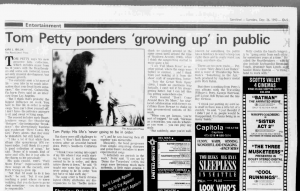Tom Petty ponders 'growing up' in public
By Kira L. Billik
Santa Cruz Sentinel - December 26, 1993
Tom Petty says his new greatest hits collection, which includes music from his 18-years with the Heartbreakers and some solo material, traces not only musical development, but personal growth.
"I've certainly seen a lot more of life—you take in so much information that your head hurts sometimes," the reserved, Gainesville, Fla.-born Petty said in an interview from Los Angeles.
"But I think that's probably the biggest influence on work. You have to live life in order to write songs. You can't close yourself off. I don't have the patience anymore to sit and sweat writing songs."
The record includes early Heartbreakers songs: the thundering "Refugee"; the insinuating "Breakdown"; the alternatingly hopeless and exuberant "Here Comes My Girl." Petty admits that they may be immature, but still hold up.
"I like a lot of that whole first album (the eponymous 1976 release) today. I still think it's a really good collection of songs," he said. "Some of it sounds kind of naive and silly, but it just adds to the charm to me personally."
His solo record, 1989's "Full Moon Fever" (represented with three songs on the record), saw Petty trying to grow up.
"Not that I'd want to do it too much," he said, "but it was just reaching a point where we were realizing that you do have to go to sleep sometime—you do have to be responsible."
But there were still challenges to be met. "I Won't Back Down" was written after an arsonist burned down Petty's Southern California home.
"I think I was coming into a part of my life where I was really starting to enjoy it, and everything seemed to be in order, and then nature threw it down," he said. "It taught me some big lessons: It's never going to be in order. You just have to take each day."
The song order is fairly chronological (Petty attributes any discrepancies to his "feeble memory") and he says hearing them all together was memorable.
Musically, the band progresses from simple sing-along choruses and guitar-heavy melodies to more experimental songs.
"I definitely see periods in the work," Petty said. "I can see by 'Damn the Torpedoes' (1979), the songs were becoming much more anthemic, a little more general. I think we sloshed around in the same arena until around the time of 'Southern Accents' (1985), when I think the songwriting started to move quite a bit.
"I see 'Full Moon Fever' as another period, where the songs were lighter in content, ... and I think from just looking at it from the sheer craft of songwriting, better. ... 'Into the Great Wide Open' (1991), I made an enormous leap lyrically, I can't tell if I'm always getting better, but I can tell that I'm getting somewhere else."
Petty wanted "Don't Come Around Here No More," his sitar-laced collaboration with former Eurythmic Dave Stewart to shake up any preconceived notions of his work.
"When you get famous, you're sort of trapped," he said, "because as a musician, you can do whatever you want—you can play any style.
"But suddenly, once you're well-known for something, the public has a tendency to want to keep you right there and to really resist you going anywhere else."
There are two new tracks—Petty's own "Mary Jane's Last Dance" and a cover of Thunderclap Newman's "Something in the Air," both produced by rap-heavy metal guru Rick Rubin.
But there is nothing from Petty's two albums with the Traveling Wilburys: Petty, George Harrison, Jeff Lynne, Bob Dylan and the late Roy Orbison.
"I think just putting my own solo stuff in there was a little bit of a stretch," he said. "I just thought if I didn't put it in, people would be disappointed. It's funny being in so many bands."
Petty credits the band's longevity to "going away from each other for sometimes years at a time." He called the Heartbreakers—which also include keyboardist Benmont Tench, drummer Stan Lynch, and bassist Howie Epstein—"a tricky band to work with."

